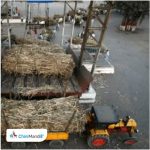Ludhiana: As the Indian government pushes for higher ethanol blending in petrol, a three-day workshop focusing on maize-based bioethanol and catchment development began on Wednesday at the ICAR–Indian Institute of Maize Research (IIMR) in Ladhowal.
The event, titled ‘Empowering Field Implementation for Maize-Based Bioethanol and Catchment Development’, brought together 27 field staff members working across 78 districts in 15 states. Participants shared updates from their regions, highlighting progress such as improved field practices, increased farmer participation, and the adoption of new maize technologies.
Director, ICAR-IIMR, HS Jat emphasised the need to enhance maize productivity through scientific and cost-effective methods. He pointed out that the government is targeting 30% ethanol blending in petrol (E30) by 2030, with maize emerging as a key source of raw material. Achieving this goal will require annual maize production of 65–70 million tonnes, growing at 8–9% per year. This, Dr. Jat said, will be possible only through high-yielding maize varieties and increased mechanisation.
The workshop is part of the project ‘Enhancing Maize Production in the Catchment Areas of Ethanol Industries’. Co-principal investigator Dr. Ph Romen Sharma and other scientists from the institute were also present.
Dr. S.L. Jat, principal investigator of the project, explained that the main objective is to ensure a steady supply of maize for ethanol production. He said the workshop provides a valuable opportunity for scientists and field workers to share experiences and improve coordination.
Once largely used for animal feed and industrial purposes, maize is now gaining ground as a key crop for ethanol production.
The ongoing workshop aims to strengthen India’s efforts toward sustainable maize cultivation with a focus on ethanol. ICAR-IIMR is leading efforts to promote Kharif maize in Punjab, targeting both crop diversification and regional maize shortages. In the 2025 Kharif season, the institute successfully demonstrated improved maize varieties across 450 acres in key districts like Ludhiana, Jalandhar, Gurdaspur, Amritsar, and others.
To support these efforts, the institute is also running training programmes and awareness campaigns. These initiatives aim to encourage farmers to shift from water-intensive crops like paddy to maize-based systems that can help meet ethanol and feed demand, conserve groundwater, and improve soil health.

















